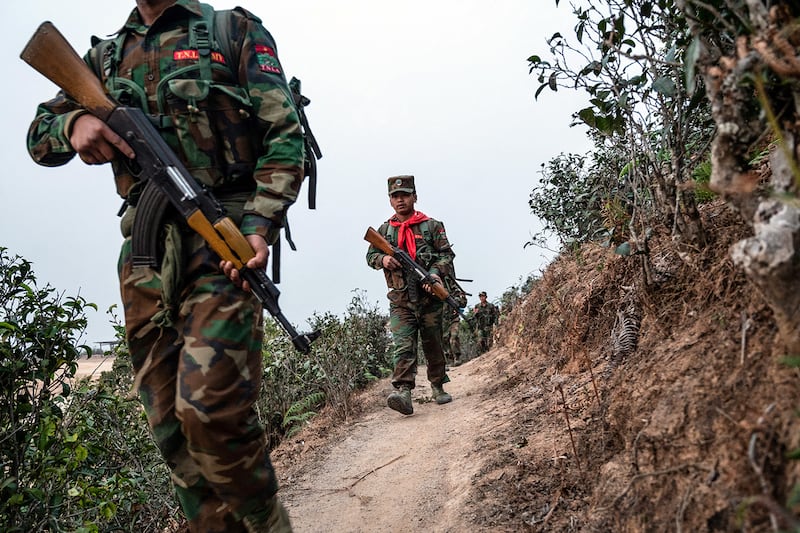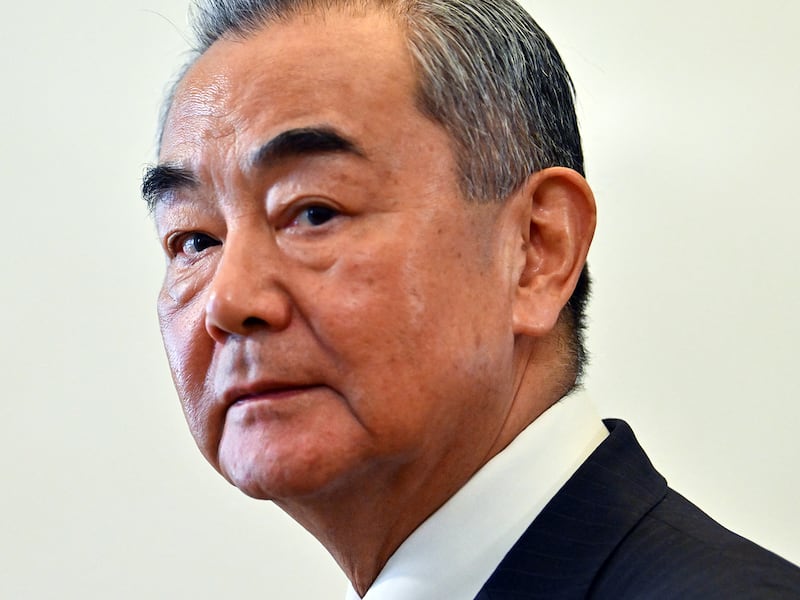Between the high level visits of Chinese Foreign Minister Wang Yi to Naypyidaw and Myanmar junta leader Min Aung Hlaing’s trip to China, the neighbors struck one piece of business – a deal to allow the deployment of Chinese private military corporations (PMCs) to operate within Myanmar.
The BBC-Burmese Service, which first broke the story, reported that there are already four Chinese private security companies that are operating in Myanmar, doing static security work.
The deployment of mercenary forces is a telling sign of China’s unease and of the desperation of the State Administrative Council (SAC), as the junta is formally called.
China is obviously very concerned about the junta’s ability to protect Chinese interests in the war-torn country, but a deployment of private Chinese armies is nothing less than a complete humiliation for Min Aung Hlaing.
Despite the military’s bravado, over half of Myanmar is now in opposition hands, and junta forces have failed to retake most of the territory they have lost since the Three Brotherhood Alliance commenced Operation 1027 in October 2023.
The Chinese deployment is a stark admission on the part of the February 2021 coup leader that his forces are spread too thin. Despite the monthly induction of 5,000 conscripts, battlefield losses, and defections are cutting into the regime’s numerical advantage.
The Irrawaddy reported that on October 22, the junta established a 13-member working committee composed of the Ministry of Defense, Ministry of Home Affairs and other ministries to draft the memorandum of understanding on the military company’s establishment and import of weaponry and communications devices.
The committee would also determine where and how the Chinese PMC could be deployed.
Chinese PMCs
The new PMC has not been established, but chances are it would be a subsidiary of or a joint venture with one of China’s large existing PMCs, which have proliferated since the 1990s when a set of laws created the framework for their operation. Those laws were amended in 2009.
Today, there are roughly 20 Chinese PMCs operating in 40 countries, mostly in Africa, to provide security for Belt and Road Initiative projects.
RELATED STORIES
Myanmar’s Kachin insurgents take control of their border with China
Residents in Myanmar feel the crunch as trade with China shuts down
Myanmar’s Kachin rebels stop rare earth exports to China
The big players in the market are De Wei Security Group Ltd, Hua Xin China Security, Guan An Security Technology, China Overseas Security Group, and Frontier Services Group.
Chinese PMC do not have the same business model as Russia’s Wagner Group, which really is used more as an expeditionary fighting force that gives the Russian government a fig leaf of plausible deniability, in pursuit of the Kremlin’s broader foreign policy interests.
Wagner’s business model is also based on the extraction of natural resources. Chinese firms, to date, have operated more on a contractual basis and have focused much more on the protection of China’s economic interests under the Belt and Road Initiative.
The attempted mutiny by Wagner’s CEO, Yevgeny Prigozhin in June 2023 has probably shaped Chinese leadership thinking about PMCs, likely prompting the Communist Party and People’s Liberation Army to step up their controls.
The firewall between the PMCs and the People’s Liberation Army has always been thin. Much of the corporate leadership as well as rank and file came out of the PLA, People’s Armed Police, or other Chinese security ministries.
The regular targeting of Chinese citizens and economic interests along the China-Pakistan Economic Corridor by Baluchi militants may be prompting a rethink in how and when Chinese PMCs can use force, and what the rules of engagement are.
Legitimately concerned about Min Aung Hlaing and the military’s competence, Beijing will be pushing hard for robust rules of engagement, and the ability to conduct offensive operations around their key economic interests.
Major Chinese interests
China has a wide range of economic interests in Myanmar.
These include their special economic zone and proposed deep-water intermodal container port in Kyaukphyu, the Wanbao copper mines, hydro electric plants in Kachin and northern Shan states, oil and gas pipelines that extend to Kunming in southwestern China, and jade and rare earth mines in Kachin.
But almost all of those projects are in areas that have come under the control of the opposition National Unity Government and its people’s defense forces, or allied ethnic resistance organizations.
Indeed, 90% of Myanmar’s natural resources are outside junta control, or in contested spaces.
What does that mean for Chinese PMCs?
If they are deployed in contested areas, such as the mines in Mandalay, Magway, or Sagaing, will they be fighting alongside junta forces?
Or will they simply be defending China’s economic interest which would free up regime troops?
Will there be intelligence sharing and targeting information, or tactical-level embedded deployments?

Given the close relationship between Chinese PMCs and the PLA, one has to look at this as the de facto deployment of PLA forces into Myanmar.
The Burmese language Khit Thit Media reported that a deal to establish a Chinese PMC in Kyaukphyu was signed this month between Gen. Kyaw Shwe Htun, the chairman of the Kyaukphyu Special Economic Zone management sub-committee, and officials from the Chinese CITIC Group Company.
The Arakan Army has surrounded Kyaukphyu, where construction on a special economic zone and port has stalled, but has made no attempt to enter it.
Would Chinese PMCs be allowed to go outside the perimeter? Could they provide intelligence, signals intercepts or targeting information to junta forces?
Punishing the ethnic armies
It’s hard to imagine that the ethnic armies will allow the deployment of Chinese PMCs in their territory.
China has already made it clear that it is doubling down on the junta, while the opposition NUG and ethnic armies have repeatedly defied Beijing by continuing to fight the military regime and reject calls for nationwide elections under junta terms.
China has tried to punish the ethnic armies by shutting down border trade, which impacts the local communities that are dependent on the flow of commerce. They have shut down the internet and electric power for many border towns.

The Chinese are now taking their pressure campaign to the next level.
On Nov. 18, Myanmar-Now reported that the Chinese had placed the Myanmar National Democratic Alliance Army (MNDAA) commander, Peng Daxun, under house arrest after summoning him to Kunming for talks.
China later denied Peng was under house arrest, saying he was receiving medical treatment.
This major escalation – coupled with additional support for the junta, including weaponry and drones, and negotiations about the deployment of private armies – should leave no one guessing as to what China’s position on Myanmar is.
Zachary Abuza is a professor at the National War College in Washington and an adjunct at Georgetown University. The views expressed here are his own and do not reflect the position of the U.S. Department of Defense, the National War College, Georgetown University or Radio Free Asia.
